Archive for 'stereotypes'
Measuring Machismo
Posted on August 10, 2011, by drini, under gender, stereotypes.
By Eva Allen
Sandwiched in the middle of Central America, with a population of just under six million and a heavily agricultural economy, Nicaragua remains the poorest country in Latin American and the Caribbean after Haiti with a Human Development Index (HDI) ranking of 115. Yet, in the 2010 World Economic Forum (WEF) Global Gender Gap (GGG) Report, it ranks at 30 of 134 countries in terms of gender-based disparities, joining a top 30 club including equality champions Iceland and the Scandinavian states, and wealthy nations Australia, the US, and the UK. The report’s message is clear - bulging state coffers are not the sole prerequisite for establishing frameworks for fairness and gender equality.
(more…)
61 Comments
Las terroristas suicidas
Posted on April 13, 2010, by Kudzai, under estereotipo, human rights, media, mujeres, politics, stereotypes, violación sexual, violence, violencia, war rape.
 Diana Cariboni
Diana Cariboni
MONTEVIDEO.- Cada vez que aparecen noticias sobre mujeres que se inmolan en sangrientos ataques terroristas, se me despierta la misma mezcla de sorpresa y horror. (more…)
46 Comments
Is it ever okay for a woman to exercise her sexuality to gain political power?
Posted on February 15, 2010, by Kudzai, under Gender Masala, arts, human rights, politics, stereotypes, women, men and more.
Kudzai Makombe

Queen Elizabeth I kept a reign on power by becoming "The Virgin Queen" Credit www.PDImages.com
This question has been puzzling me since a late-night, noisy get together with friends where we got talking (some might say gossiping) about the alleged cross-party sexual politics taking place in our government. The men, it was said, were using sex as a strategy to silence the women from the opposite camps. The woman targeted loses her standing once she’s been seduced as it quickly becomes general knowledge among other politicians.
“Once you see that so and so who used to be so vocal has gone quite then you know they’ve been had,” said one friend. Much like the boarding school strategy employed by male students to remove the top performing girl student’s ranking as number one in class I’m told. But, never having been to boarding school, much less a co-educational school, I am not aware.
As much as this dirty trick is an age-old male strategy to silence female opponents, women throughout history have used their sexuality, that is — whom one has sex with (or not), in what ways, why, under what circumstances, and with what outcomes — as a strategy to gain power. (more…)
56 Comments
Sherezade y el sultán, en el siglo XXI
Posted on February 12, 2010, by Kudzai, under Gender Masala, arts, culture, media, stereotypes.
Diana Cariboni
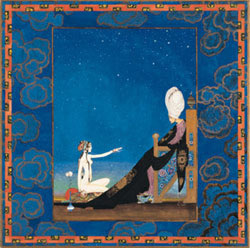 Espero entre indignada y divertida el próximo 8 de marzo, Día Internacional de la Mujer… El anterior me deparó una pasmosa sorpresa. Sobre mi escritorio había una enorme rosa de pétalos amarillos y bordes rojos y una tarjeta dirigida a las mujeres del siglo XXI, en su día. (more…)
Espero entre indignada y divertida el próximo 8 de marzo, Día Internacional de la Mujer… El anterior me deparó una pasmosa sorpresa. Sobre mi escritorio había una enorme rosa de pétalos amarillos y bordes rojos y una tarjeta dirigida a las mujeres del siglo XXI, en su día. (more…)
158 Comments
A New Year for Gender Masala
Posted on January 2, 2010, by mercedes, under Gender Masala, culture, media, stereotypes, women, men and more.
This is truly a New Year in many ways: Gender Masala and I are in transition in 2010.
I am moving to Maputo, Mozambique, to work in health reporting. Gender Masala will remain in the IPS Gender Portal with a more collective identity, infused by several IPS writers.
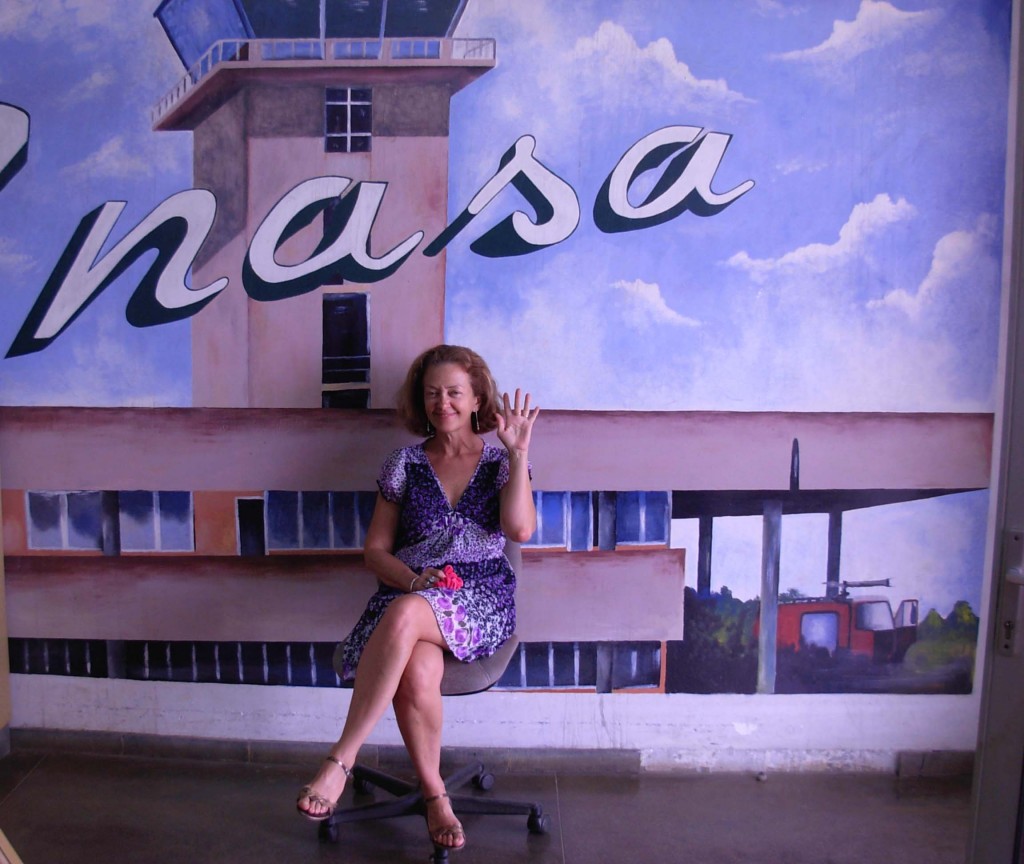
Passenger in transit: "The real voyage of discovery consists not in seeking new landscapes but in having new eyes." Marcel Proust. Pic by Claudio Corallo.
I like the word transitions: it evokes change, birth, adaptation, growth.
This has been an exciting journey of discovery of a new medium. As the philosopher George Santayana wrote: “There is wisdom in turning as often as possible from the familiar to the unfamiliar; it keeps the mind nimble; it kills prejudice, and it fosters humor.”
Over seven months, , the pictures got bigger, the voices varied, my style freer. It was intellectually rewarding to look every week at the rich variety of IPS stories on gender and be inspired by them to write a new blog.
I will miss the weekly postings on gender, although I will continue blogging on health issues in Mozambique here:
http://knight.icfj.org/OurFellows/FromtheFieldFellowBlogs/
I want to thank my fellow bloggers, you, the readers, and, most importantly, IPS, for this opportunity to add a spicy mix to the MDG3 Gender Portal. I enjoyed it immensely and I hope you did too.
Peace in 2010.
219 Comments
A Babel of Jargon
Posted on December 31, 2009, by mercedes, under Gender Masala, culture, media, stereotypes.

A collective indigestion of jargon. Photo by Beralpo, Wikimedia Commons
My friend is looking for a job. He finds an ad of the US-based Mercy Corps and calls me for a translation. The ad is in English - sort of - but he can’t figure out what it is about:
“Invitation for a consultancy in conducting a training on enhancing facilitation skills of development practitioners of livelihood enhancement programs.”
What does this text mean exactly, except that we have a collective indigestion of development jargon from NGOs and the UN, from academics and politicians, and that the media is complicit in this masquerading of long words as substance? (more…)
61 Comments
Famous and infamous births
Posted on December 21, 2009, by mercedes, under Gender Masala, arts, children, culture, health, human rights, media, politics, religion, reproductive health, stereotypes, violence, women, men and more.
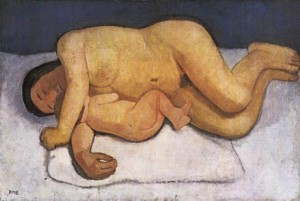
By Paula Modersohn Becker
When is a photo of a woman giving birth considered pornographic? Take your pick:
A. When it is shown in a pornographic magazine, film or website.
B. Never.
C. When it is emailed to government officials urging action to improve public health.
One could argue about A and B but this blog is about C.
Earlier this year, in Zambia, Chansa Kabwela, news editor at the feisty opposition newspaper The Post, was charged with circulating pornography with intent to corrupt public morals. (more…)
123 Comments
WORLD AIDS DAY 2009
Posted on December 1, 2009, by mercedes, under Gender Masala, HIV/AIDS, arts, children, gays and lesbians, harmful practices, health, human rights, media, politics, religion, reproductive health, stereotypes, truth commissions, violence, war rape, women, men and more.
We share the wish of Marie Mendene Owono: SEND AIDS AWAY.
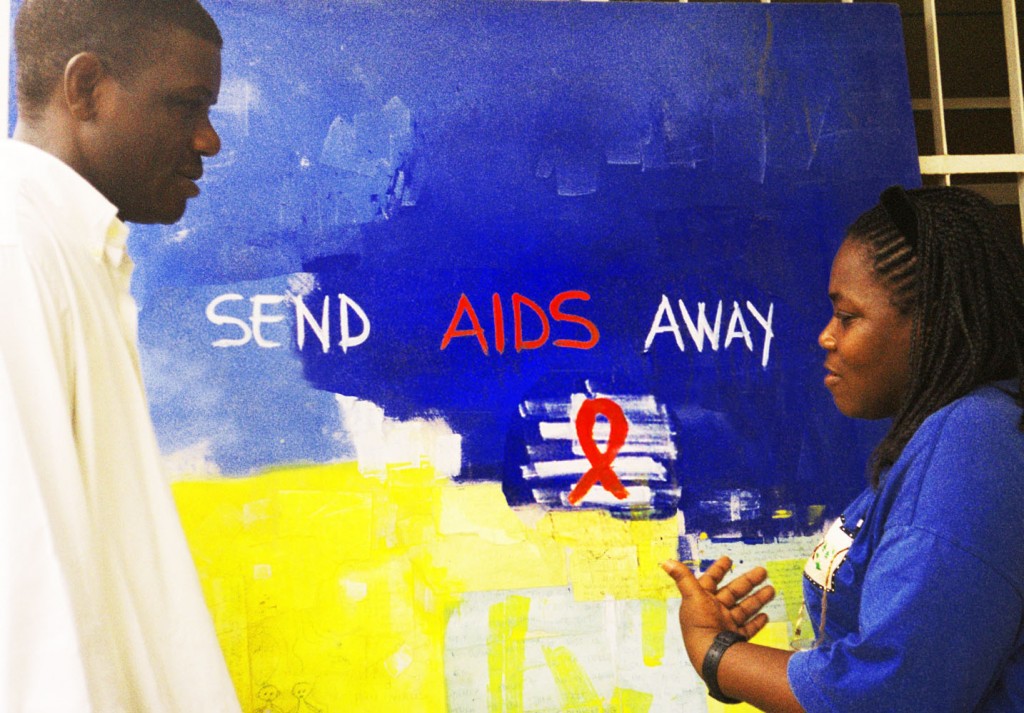
By M. Sayagues
Marie Mendene is an extraordinary activist from Cameroon and one of the first African women to say publicly that she lives with HIV, in the 1990s, when AIDS was a disease of shame and blame.
This is one of my favourite photos about AIDS in Africa. I took it at Sunshine, her NGO in Douala, in 2003, before antiretroviral treatment became widely available. Only a few Cameroonians in cities could get the life-saving pills.
The day I took the photo, Marie had queued for seven hours and received only half of her monthly ARV pills. She was understandably upset about the poor logistics and delivery of medicines. AIDS magnified all the inadequacies of health systems.
That was then. Today, nearly three million people in Africa are on ARV treatment. This seemed like a dream then, but activists were campaigning hard to make it come true.
Marie had a clear vision of activism. “We should go beyond the begging bowl and the appeal to compassion, beyond the stage of being used to do prevention and awareness, and become part of real-decision making around AIDS,” she told me.
Marie is to the right in the pic, with a fellow activist.
132 Comments
Watchdog citizen journalism against gender violence
Posted on November 27, 2009, by mercedes, under Gender Masala, culture, harmful practices, human rights, media, politics, stereotypes, violence, women, men and more.
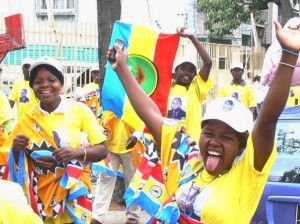
The sisters can do it by themselves. By A. Vilanculos
The buzz in Mozambique during the recent elections was not the TV debate among presidential candidates debate (there is none) or their programs (all vague).
What had tongues wagging was citizen’s journalism, dispatches by ordinary folk about electoral irregularities from the Rovuma to the Maputo rivers.
Good stuff: government cars illegally used for campaigning, with cellphone pics of their registration plates (until officials wised up and started covering up plates and ministry logos with party posters). Reports of youth tearing downs other party’s posters, fistfights, intimidation, and police lack of impartiality. (more…)
22 Comments
A spiritual gift
Posted on November 23, 2009, by mercedes, under Gender Masala, arts, children, culture, human rights, religion, stereotypes, violence, women, men and more.
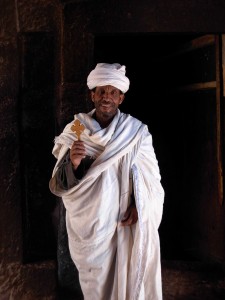
Patriarchal in all senses. By M. Sayagues
What drives a 17-year-old girl to enter a monastery? Today she is 30, and still happy about her choice. Her eyes sparkle and her laughter comes easy. She exudes peace.
I will call her Gabra (gift, in Amharic), for our conversation was private. I met her at a monastery near Lalibela, the mystical city of rock-hewn churches in northern Ethiopia.
Monastic life has a long tradition and prestige in the Ethiopian Orthodox Church. The oldest monastery dates from the 6th century. A monastic renaissance between the 13th and 16th century brought great moral and political authority to clergy.

Custodians of tradition
Gabra’s rock-hewn monastery dates from the 12th century. Her room is excavated in the pink tufa rock. Two built-in-the-rock platforms, covered with a thin mattress, do as couch and bed. An old cupboard holds a few plates and cooking utensils, three of the long green robes worn by Ethiopian peasants, the white headscarves that nuns wear, and two pairs of sandals.

